10.motivation
英语作文我的锻炼计划
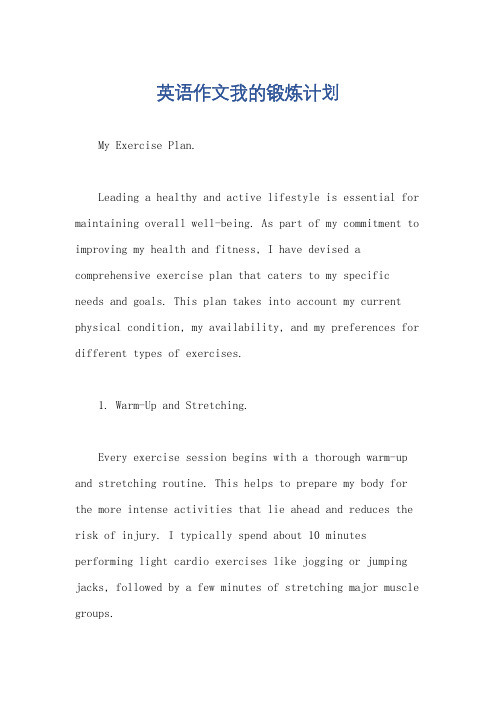
英语作文我的锻炼计划My Exercise Plan.Leading a healthy and active lifestyle is essential for maintaining overall well-being. As part of my commitment to improving my health and fitness, I have devised a comprehensive exercise plan that caters to my specific needs and goals. This plan takes into account my current physical condition, my availability, and my preferences for different types of exercises.1. Warm-Up and Stretching.Every exercise session begins with a thorough warm-up and stretching routine. This helps to prepare my body for the more intense activities that lie ahead and reduces the risk of injury. I typically spend about 10 minutes performing light cardio exercises like jogging or jumping jacks, followed by a few minutes of stretching major muscle groups.2. Cardio Workouts.Cardiovascular exercises are crucial for improving heart health and burning calories. I incorporate a variety of cardio workouts into my routine, including running, cycling, and swimming. These activities are designed to raise my heart rate and keep it elevated for a sustained period, thereby improving my endurance and cardiovascular endurance.3. Strength Training.To build muscle mass and strengthen my bones, I include regular strength training sessions in my exercise plan. I focus on a combination of free weights and machine exercises, targeting all major muscle groups. This helps to ensure balanced development and reduces the risk of overuse injuries.4. Flexibility and Balance Training.To improve my flexibility and balance, I perform yoga and tai chi several times a week. These activities not only help to stretch and strengthen my muscles but also promote relaxation and mindfulness.5. High-Intensity Interval Training (HIIT)。
(完整版)英语词汇学英语词汇学习题3及答案
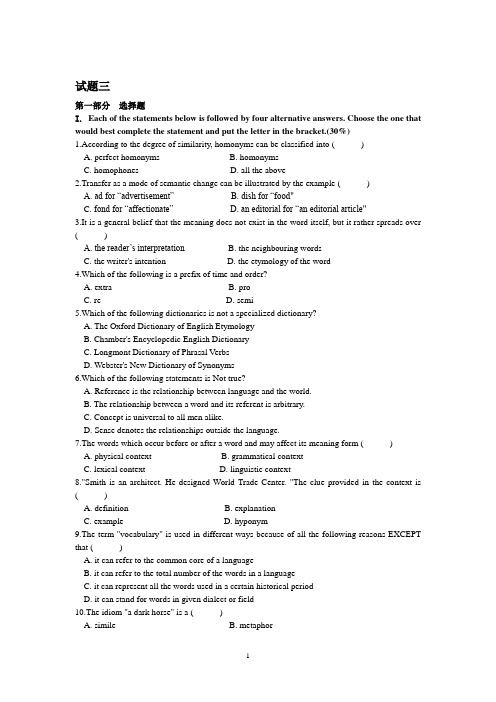
试题三第一部分选择题I. Each of the statements below is followed by four alternative answers. Choose the one that would best complete the statement and put the letter in the bracket.(30%)1.According to the degree of similarity, homonyms can be classified into ( )A. perfect homonymsB. homonymsC. homophonesD. all the above2.Transfer as a mode of semantic change can be illustrated by the example ( )A. ad for “advertisement”B. dish for “food"C. fond for “affectionate”D. an editorial for “an editorial article"3.It is a general belief that the meaning does not exist in the word itself, but it rather spreads over ( )A. the reader’s interpretationB. the neighbouring wordsC. the writer's intentionD. the etymology of the word4.Which of the following is a prefix of time and order?A. extra-B. pro-C. re-D. semi-5.Which of the following dictionaries is not a specialized dictionary?A. The Oxford Dictionary of English EtymologyB. Chamber's Encyclopedic English DictionaryC. Longmont Dictionary of Phrasal VerbsD. Webster's New Dictionary of Synonyms6.Which of the following statements is Not true?A. Reference is the relationship between language and the world.B. The relationship between a word and its referent is arbitrary.C. Concept is universal to all men alike.D. Sense denotes the relationships outside the language.7.The words which occur before or after a word and may affect its meaning form ( )A. physical contextB. grammatical contextC. lexical contextD. linguistic context8."Smith is an architect. He designed World Trade Center. "The clue provided in the context is ( )A. definitionB. explanationC. exampleD. hyponym9.The term "vocabulary" is used in different ways because of all the following reasons EXCEPT that ( )A. it can refer to the common core of a languageB. it can refer to the total number of the words in a languageC. it can represent all the words used in a certain historical periodD. it can stand for words in given dialect or field10.The idiom "a dark horse" is a ( )A. simileB. metaphorC. metonymyD. personification11.An idiom differs from a free phrase in that the former is ( ) and the latter is not.A. structurally changeableB. semantically analyzableC. structurally fixedD. easily understood12.We can work out the meaning of heliocentric and geocentric according to ( )A. morphological structureB. relevant detailsC. grammatical structureD. physical context13.What causes the ambiguity of the sentence ”I like Mary better than Janet"? ( )A. VocabularyB. SituationC. StructureD. None of the above14.Early Modern English refers to the language spoken ( )A. from 1066 to 1500B. from 1150 to 1500C. from 1500 to 1700D. from 1600 to 180015.Affixes added to the end of words to indicate grammatical relationships are known as ( )A. bound rootsB. free morphemesC. inflectional morphemesD. derivational affixes第二部分非选择题Ⅱ.Complete the following statements with proper words or expressions according to the course book. (10%)16._________________ meaning refers to the part of speech, tenses of verbs, etc.17.The word __________ has the old meaning "servant" and the elevated meaning "head of a ministry".18.The relationship between sound and meaning is arbitrary or ______________.19.When a word with more than one meaning is used in unclear context, it creates _______________.20.Almost all affixes are __________morphemes because few can be used as independent words.Ⅲ.Match the words in Column A with those in Column B according to 1)rhetorical features of the idioms; 2)sense relations; 3)assimilation degree; 4)characteristics of the basic word stock and 5)motivation.(10%)A B21.reiteration ( ) A. high and low22.repetition ( ) B. pick and choose23.juxtaposition ( ) C. face to face24.perfect homonym ( ) D. Failure is the mother of success.25.personification ( ) E. hiss26.portus ( ) F. bear; beare ( ) G. twitter28.heart ( ) H. cat29.birds ( ) I. port30.snakes ( ) J. heart and soulⅣ.Study the following words and expressions and identify 1) types of context clues; 2) typesof word formation; 3) types of word-meaning changes and 4) rhetorical features of idioms.(10%)31.making a restatement of a new word or concept in familiar words ( )32.sitcom ( )33.the usual amenities such as a pub, a post office and a school ( )34.form cradle to grave ( )35.might and main ( )36.fax ( )37.disobey,impolite, ( )38.hussy:"housewife"→"a woman of low morals"( )39.disease:"discomfort"→"illness"( )40.fond:"foolish"→"affectionate"( )Ⅴ.Define the following terms.(10%)41.dictionary42.pejoration43.idioms nominal in nature44.Germanic45.allomorphⅥ.Answer the following questions. Y our answers should be clear and short. Write your answers in the space given below.(12%)46.What are the stylistic features of idioms?47.How would you explain the difference between back formation and suffixation? Give examples to illustrate your point.48. How do you distinguish inflectional affixes and derivational affixes?Ⅶ.Analyze and comment on the following. Write your answers in the space given below.(18%)ment on the following pairs of sentences in terms of superordinate and subordinates.a. The man said he would come to our school next week.b. The visiting scholar said he would visit our university next Monday.50.Analyes the morphological structures of the following words and point out the types of the morphemes.unbearable, international, ex-prisoner试题参考答案Ⅰ.Each of the statements below is followed by four alternative answers. Choose the one that would best complete the statement and put the letter in the bracket.(30%)1.D2.B3.B4.C5.B6.D7.C8.C9.A 10.B11.C 12.A 13.C 14.C 15.CⅡ.Complete the following statements with proper words or expressions according to the course book.(10%)16. Grammatical 17. minister 18. conventional 19. ambiguity 20. boundⅢ.Match the words in Column A with those in Column B. (10%)21.B 22.C 23.A 24.F 25.D26.I 27.H 28.J 29.G 30.EⅣ.Study the following words and expressions and identify 1)types of context clues; 2)types of word formation; 3)types of word-meaning changes and 4)rhetorical features of idioms.(10%)31.explanation32.head+head blending33.hyponymy/hyponym34.figure of speech; metonymy35.phonetic manipulation/alliteration36.back clipping37.affixation, prefixation or negative prefixes38.degradation39.narrowing40.elevationⅤ.Define the following terms.(10%)41. Dictionary is a book which presents in alphabetical order the words of a language, with information as to their spelling, pronunciation, meaning usage, etc.42. Degradation or pejoration of meaning is the opposite of semantic elevation. It is a process whereby words of good origin fall into ill reputation or non-affective words come to be used in derogatory sense.43.(1)Each idiom has a noun as the key word.(2)Each functions as a noun/also knows asnoun idioms.44.a term used to refer to a branch of the Indo-European language family, which consists of English, German, Dutch, etc.45.one of the variants that realize a morphemeⅥ.Answer the following questions.(12%)46.(1)Many idioms were created in different professions, so they were trade-or profession-related, colloquial and informal.(2)Now most become a part of the common core, neither formal nor informal.(3)There are still many colloquialisms, slang expressions, literary expressions comparatively small in number.47.A)Suffixation is the formation of new words by adding suffixes to bases.B)Back-formation is considered to be the opposite process of suffixation; it's the method of creating words by removing the supposed suffixes.48.Inflectional affixes are affixes (1) attached to the end of words; (2) to indicate grammatical relationships, while derivational affixes are affixes; (3) added to other morphemes; (4) to create new words.Ⅶ.Answer the following questions. Your answers should be clear and short Write your answers in the space given below.(18%)49.要点:Superordinate Subordinate1) man scholar2) come visit3) school university4) week Monday50.1)Each of the three words consists of three morphemes unbearable(un+bear+able), international (inter+nation+al), ex-prisoner(er+prison+er).2)Of the nine morphemes, only bear, nation and prison are free morphemes as they can exist by themselves.3)All the rest un-,-able,inter-,-al, ex-and-er are bound as none of them can stand alone as words.。
会计 专业英语词汇
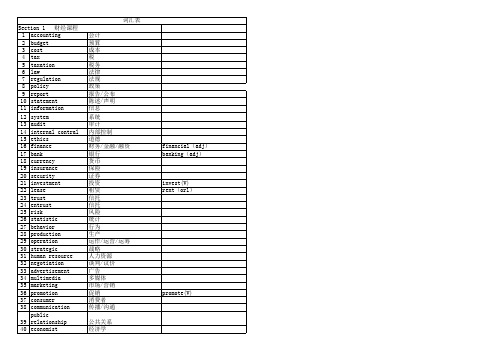
financial(adj) banking(adj)
invest(V) rent(orl)
promote(V)
42 43 44 45 46 47 48 49 50
macrotrade theory method practice principle fundamental concept tourism
(V) optimal allocate(V) distribute (V) summarize(V) analysize(V) reasoning(V) envaluate(V) conclude(V) effective(adj) efficient (adj)
(adj)
autorize (V)授权
Section 5 管理学 1 situation 2 contribution 3 flexible 4 fixable 5 adapt
情景,情况 贡献 有弹性的 固定的 调节/调整
contribute(V)
6 7 8 9 10 11 12 13 14 15 16 17 18 19 20 21 22 23 24 25 26 27 28 29 30 31 32 33 34 35 36 37 38 39 40 41 42 43 44 45 46 47 48
挑战 环境/境遇 环境/自然环境 表现,行为,业绩 优点 缺点 优先顺序,优先级 时间表,计划表 专家 专家意见 决定 分解 个体的 公共的 决定 头脑风暴,集思广益 邀请 建议 提议 劝告 图谋 细节 框架 指导方针 投票,选票 预测 量化 定量的 定性的 数量 边际,利润 期望 代理商 操纵,实施 检查 周期 测量 评价 估计 评估 评估 结构 任命,约会
钱(现金) 钱(总称) 钱(硬币) 钱(纸币) 钞票 总公司 总部 分支 分支 子公司 跨国的 海外的 注册 咨询 标准化 中心化 一体化 多元化 重组 兼并 联合 收购 剥离
八年级上册英语书单词1~10单元
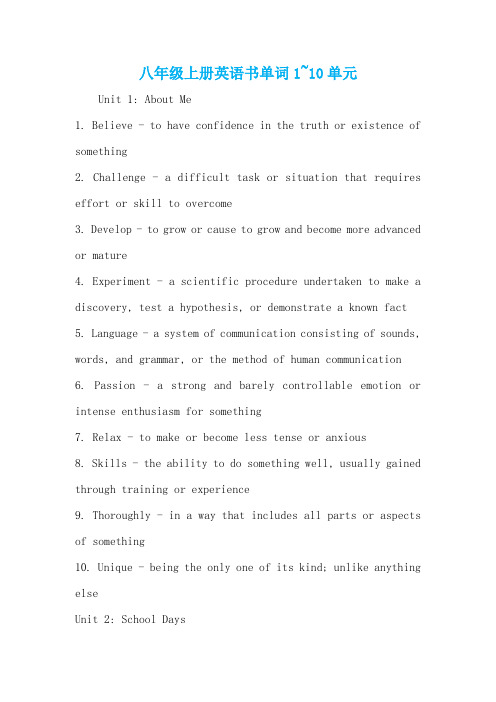
八年级上册英语书单词1~10单元Unit 1: About Me1. Believe - to have confidence in the truth or existence of something2. Challenge - a difficult task or situation that requires effort or skill to overcome3. Develop - to grow or cause to grow and become more advanced or mature4. Experiment - a scientific procedure undertaken to make a discovery, test a hypothesis, or demonstrate a known fact5. Language - a system of communication consisting of sounds, words, and grammar, or the method of human communication6. Passion - a strong and barely controllable emotion or intense enthusiasm for something7. Relax - to make or become less tense or anxious8. Skills - the ability to do something well, usually gained through training or experience9. Thoroughly - in a way that includes all parts or aspects of something10. Unique - being the only one of its kind; unlike anything elseUnit 2: School Days1. Absent - not present in a particular place, either physically or mentally2. Behavior - the way in which one acts or conducts oneself, especially towards others3. Composition - a piece of writing, especially a school essay or other written assignment4. Distance - the length or space between two points, places, or objects5. Exam - a formal test of a person's knowledge or proficiency in a subject or skill6. Grade - a level of quality or rank given to someone or something based on their standard or ability7. Homework - tasks assigned to students outside of regular school hours, to be completed at home8. Motivation - the reason or reasons one has for acting or behaving in a particular way9. Schedule - a plan for carrying out a process or procedure, often with specified times and durations10. Study - the process of learning about a subject, typically through reading, researching, and memorizing informationUnit 3: Geography1. Border - a line separating two political or geographical areas, especially countries2. Capital - the most important city or town of a country or region, usually where the government is located3. Climate - the typical weather conditions of a region, including temperature, humidity, precipitation, and wind patterns4. Continent - any of the main continuous landmasses of the earth, usually having widely recognized boundaries (i.e. Asia, Europe, North America)5. Environment - the surroundings or conditions in which a person, animal, or plant lives or operates6. Island - a piece of land surrounded by water7. Landscape - all the visible features of an area of countryside or land, often considered in terms of their aesthetic appeal8. Natural - existing in or caused by nature; not made or significantly altered by human beings9. Population - all the inhabitants of a particular town, area, or country10. Region - an area or division, especially part of a country or the world having definable characteristicsUnit 4: Hobbies and Interests1. Artistic - having or demonstrating skill and creativity in the arts2. Collect - to gather and accumulate (objects, items, or experiences)3. Decorate - to furnish or adorn with something attractive or beautiful4. Express - to convey or communicate (thoughts, feelings, or ideas) in a specific manner5. Hobby - an activity done regularly in one's leisure time for pleasure or enjoyment6. Instrument - a tool or device used for a particular purpose or activity7. Photography - the art, process, or occupation of taking and developing photographs8. Relaxation - the state of being free from tension and anxiety; a way to rest and revitalize oneself9. Talent - a natural aptitude or skill in a specific area or field10. Workshop - a room or building in which goods are manufactured or repaired; a place for practical training or group activity。
每日十个单词
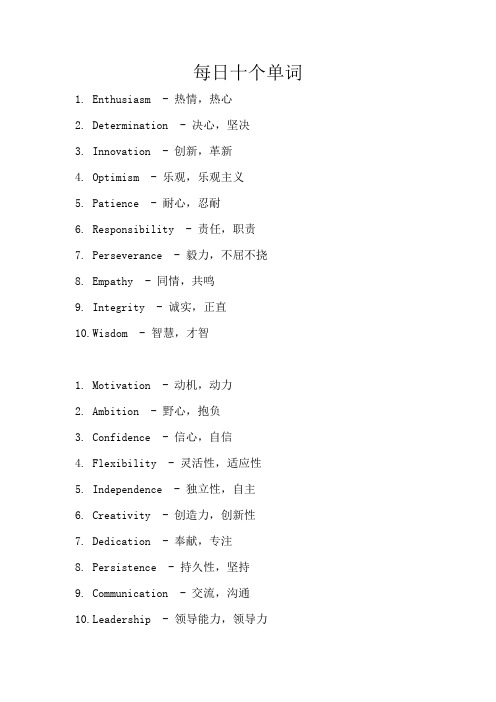
每日十个单词1.Enthusiasm - 热情,热心2.Determination - 决心,坚决3.Innovation - 创新,革新4.Optimism - 乐观,乐观主义5.Patience - 耐心,忍耐6.Responsibility - 责任,职责7.Perseverance - 毅力,不屈不挠8.Empathy - 同情,共鸣9.Integrity - 诚实,正直10.W isdom - 智慧,才智1.Motivation - 动机,动力2.Ambition - 野心,抱负3.Confidence - 信心,自信4.Flexibility - 灵活性,适应性5.Independence - 独立性,自主6.Creativity - 创造力,创新性7.Dedication - 奉献,专注8.Persistence - 持久性,坚持munication - 交流,沟通10.L eadership - 领导能力,领导力1.Challenge - 挑战,难题2.Opportunity - 机会,机遇3.Success - 成功,成就4.Failure - 失败,未能成功5.Knowledge - 知识,学识6.Wisdom - 智慧,才智7.Understanding - 理解,领悟passion - 同情,怜悯9.Respect - 尊重,敬重10.I ntegrity - 诚实,正直1.Evolution - 进化,演变2.Revolution - 革命,变革3.Harmony - 和谐,融洽4.Diversity - 多样性,多元性5.Innovation - 创新,革新6.Collaboration - 合作,协作7.Empowerment - 授权,增强能力8.Transformation - 转变,变形9.Engagement - 参与,投入10.S ustainability - 可持续性,持久性。
英语答案

Unit 1Text AExerciseV1. solutions2. ignore3. persuade4. assign5. deadline6. approach7. stuck8. essentials9. managed10. necessarily11. retained12. due, draftVI1. put in2. make the most of3. put down4. lead to5. get her hands on6. put away our picnic things7. to stick to8. time after time9. has cut down on smoking10. counts for much moreVIII1. thus cutting down on our costs2. while having his breakfast3. so that he can memorize a couple of new words everyday while cooking his meals4. thus greatly increasing his reading speed5. while studying Chinese modern history at Beijing University6. thus being able to do very well in their work7. while doing his homework8. so that you can become one, tooIX1. used to go2. got used to getting3. used to study, has got used to working4. used to say5. used to write, got used to communicatingXI1. went unnoticed2. go unpunished3. go uncorrected4. goes unnoticed, unmentioned5. go unreportedXIII. Translation1. Tom, a very curious boy, is interested not only in whats but also in whys and hows.2. According to Professor Smith, happiness is the ability to make the most of what you have.3. You’d better keep the book where your 15-year-old son can’t get his hands on it.4. The story was so funny that Bill kept laughing all the time while reading it.5. High-achieving students do not necessarily put in more timeat their studies than their lower-scoring classmates.6. How did you manage to persuade these students to take the speed-reading course?7. Working hard is important, but knowing how to make the most of one’s abilities counts for much more.8. She asked her students to think for themselves rather than telling them what to think.Text BExerciseI1. opposite2. preference3. located4. feasible5. perspective6. have shifted7. concern8. attractive9. survive10. transfer12. particularly13. treasure14. DespiteII1. on the other hand2. keep up3. As for4. for good5. turned out6. come of age7. what if8. welled upUnit 2Text AExerciseIII2. bounced3. Conversation4. previous5. encouragement6. parallelIV1. entirely2. objection3. challenged4. original5. responsible6. relative7. halfway8. startled9. simply10. back and forth11. joined in12. just as13. knocked down14. came to a halt15. Even if16. fell apartV1. unconsciously2. response3. previous4. suitable5. even though6. disagree7. topic8. calling on9. switched10. and so on11. in line12. take turnsVI1. Excellence2. independence3. intelligence4. significance5. patience6. silence7. violence8. differences9. distance10. confidenceVII1. disappeared2. disorder3. dishonest4. disobey5. disagree6. disadvantages7. discomfort8. dislike9. disbelief10. dissatisfiedVIII(A)1. Whoever is most qualified2. Whoever has money3. Whoever holds it4. whoever is not with him5. whoever would take the job6. Whoever fears to face his own past(B)1. Whatever they have2. whatever decisions he makes3. Whenever the weather is bad4. wherever he goes5. Whichever direction you turn to6. however hard she triedIX1. No wonder it’s freezing cold today2. No wonder there is no picture on the screen3. No wonder many career women are not married4. No wonder they asked so many questions5. No wonder it has become a best-seller of this spring6. No wonder US students are anxious about mathXII1. Referring to the differences between American English and British English, he said, “The United States and Britain are two different countries after all.”2. Professor Smith encourages his students to think for themselves. He often says, “I am just as happy, even if you challenge me or completely disagree with me.”3. We called on him to take part in our conservation about pop music, but as soon as he joined in, he introduced a new topic and referred to the NBA finals of the previous week.4. The driver is responsible for this accident. His car knocked down a tree and a man on his bike.5. Since our production of radios came to a halt, we have switched to the production of mobile phones.6. Our original plan was to see such famous sights as the Great Wall, the Palace Museum and the Summer Palace in Beijing.7. It’s no simple matter to learn a foreign language well. Even though I have learned English for a few years, I still can’t express myself effectively in the language.8. I don’t want you simply to agree or disagree with me – I need someone who can give me good advice, ideas, and so on.Text BExerciseI1. academic2. intelligence3. reflects4. Social5. predicted6. context7. advantage8. attitude9. traits10. communication11. distinguish12. represented13. influences14. matureII1. getting…across2. come out3. Because of4. in short5. as a result6. as well7. in some cases8. sent outUnit 3Text AExerciseIV1. draw2. bear3. worn out4. got tired of5. racial6. paid, attention to7. mature8. broke into9. performed10. conquer11. aspects12. As far asV1. Brought up2. broke into running3. amazed4. All his wife could do was5. resemble6. with ease7. conquered8. wear out / are worn out9. turned out10. has grown into11. tragedy12. promptlyVI1. personal2. traditional3. humorous4. logical5. courageous6. poisonous7. educational8. victoriousVII1. darkness2. carelessness3. nervousness4. preparedness5. illness6. eagerness / nervousnessVIII1. go on playing2. went on reading3. went on to explain4. went on to teach5. went on playing6. went on to tellX1. work as fast as a skilled worker2. couldn’t perform as well as his parents had expected3. he promised that he would go and see his grandparents as often as possible4. that after finishing his studies abroad he would come back as soon as possibleXII1. As far as I know, all they have to do is come and see the child they want to bring up and fill out a form.2. As he learned more and more about the world, he finally got tired of going after fame and wealth.3. The little girl’s songs brought sunshine to the old man and helped him bear the hardships of life.4. People came one after another to congratulate them on the successful building of another big bridge over the Huangpu River.5. All the people present were amazed that the 10-year-old boy was playing the violin so skillfully.6. After the car accident, Stevie reevaluated his goals in life and decided to pay more attention to the world outside.7. Mother could never have imagined that her son would become a world-famous pianist even in her wildest dreams.8. The students broke into loud cheers when they heard that their teacher had fought back from the shadow of death. Text BExerciseI1. potential2. suggestions3. realistic4. embarrassed5. impression6. negative7. presently8. reacted9. improvement10. target11. inferior12. conceptII1. built up2. dwell on3. do justice to myself4. from the start5. were based on6. set aside7. wiped out8. improve on9. do, harm10. is working onUnit 4Text AExerciseIV1. endure2. accumulated3. somewhat4. property5. informed6. wrinkled7. collapsing8. mourning9. contributed10. possessed11. recovered12. trembled13. fulfill14. drove15. stagger16. utteredV1. because of2. be blessed with3. as well as4. spoke of5. a good deal of6. at most7. stand on its feet8. be ashamed of9. as soon as10. leaning onVI1. a bearded young man2. three colored pictures3. a flowered lawn4. a gifted 〈talented〉pianist5. an old lady with a wrinkled face6. a home for the aged7. a cultured college student8. an experienced driver9. a skilled engineer10. a spirited<hitted> discussionVII1. shameless2. cheerful3. endless4. windless5. fearless6. countless7. meaningful8. colorful9. delightful10. thoughtfulIX1. Nor did he give me any explanation.2. Nor did he feel ashamed for that.3. Nor do I think it necessary to do so.4. Nor will he invite his relatives and friends.5. Nor did we know his phone number.6. Nor did she enter the home for the aged.XIII1. Sick and weak as Grandma is, she has undertaken all the housework in the family.2. The recording company had never been so pleased with any singer. For them, Stevie Wonder was a real find.3. They had no running water where they lived. Nor did they have conveniences of life such as gas and electricity.4. Six years passed, then seven and eight, and nothing was heard of that French artist. It seemed certain that he had left the country for only God knows where.5. He was very ill that summer, but as soon as he felt better in the fall, he resumed his writing and finished his novel within two months.6. Driven by a strong will, Alex finally fulfilled the task he had undertaken.7. With the help of the doctor and the nurses, the patient recovered quickly and in a few weeks was able to stand on his feet once more.8. It was really sad to watch the old man’s wrinkled face, which spoke of all that he had endured in his life.Text BExercise B1. D2. D3. A4. B5. A6. B7. D8. A9. B10. AVocabulary Exercises I1. responsibilities2. purchase3. portrays4. vanished5. immense6. decent7. eventually8. motivation9. reputation10. restore11. neighborhood12. sustain13. upholds14. creditII1. paved the way for2. is attributed to3. out of habit4. kept his word5. open the door to6. think twice7. think of … as8. care about9. had been passed on10. To this dayUnit 5Text AExerciseV1. compromise2. content3. Unfortunately4. individual5. gamble6. spun7. attractive8. afterwards9. tradition10. unique11. arose12. energeticVI1. a little2. and so on3. as well4. give way to5. in the same way as6. had in mind7. most of the time8. have been on their feet9. went off10. are named after11. has no right to12. sorted outVII1. compromise with…over2. lying…in3. lie on4. content with5. call at6. called on7. named…after8. active in9. opinions about10. opinion ofVIII1. uncertain2. unknown3. unable4. unfortunate5. incorrect6. impatient7. illegal8. irregular9. irrelevant10. improperX1. What a pity you won’t be back before I leave!2. What a pity to waste the food!3. What a pity she isn’t here!4. What a pity that we can die only once for our country!5. What a pity that some of the best acting on stage today can only be seen by so few people!6. What a pity you can’t swim.XII1. That’s where2. That’s why3. that’s where4. That’s what5. That’s how6. That’s how7. that’s when8. that’s when9. that’s what10. That’s whereXIV1. They are Mary’s sons Robert and Lawrence. One is namedafter her father; the other is named after her grandfather.2. He is not content with what has already got. What a pity he never understands that happiness lies in contentment.3. She is very active in classroom activities. I am sure she will make a good teacher.4. You may have different opinions about it, but I hate the idea of urging people to drink, especially at a dinner party.5. We are prepared to give way a little to them on minor problems, but we will never compromise with them on major questions of principle.6. Robert did not usually get much exercise during the year, while his wife Mary was on her feet most of the time. That’s why it was impossible, or difficult at least, for them to choosea place they both liked for their holiday.7. David is a young writer with a high opinion of himself. He thinks that his writing style is unique and refined. But unfortunately, that is not the case.8. All I want to say is that as individuals we enjoy many different rights, but we have no right to do anything harmful to society.Text BExerciseI1. effective2. argument3. alert4. typical5. avoid6. patience7. hostile8. mention9. significant10. complain11. bothered12. historical13. tempted14. selfishII1. lose her temper2. changed for the better3. make matters worse4. fell behind5. will take offence6. launched into7. added to8. saw eye to eye9. hold their tongues10. poke fun atUnit 6Text AExerciseIV1. shocked2. admitted3. pursue4. prefer5. intelligent6. acquire7. average8. cultivate9. typical10. pursuit11. imported12. bite13. compete14. constantly15. prestigious16. extentV1. dedicated to2. stood a chance3. held up as4. least of all5. conform to6. compares…to7. done away with8. deprived of9. looked down upon10. adapt to11. instead of12. keep upVIII1. If we are to promote higher education, we must try to make university professorships the most prestigious positions in the country.2. If we are to remain a world-class power, our universities must be able to train students to become first-class scholars and engineers.3. If you are to make your child a person of knowledge, you must encourage him to spend more time studying.4. If you are to apply for this scholarship, fill out the application form and return it now.5. If we are to further develop the economy of Shanghai, we have to make full use of the Yangtze River.XII1. The problem lies in how people look at those students dedicated to the pursuit of knowledge.2. Our government has decided to put a lot more money into education than before.3. We have to train more first-class engineers to compete in the technology race with Japan.4. The intellectually curious and hard-working students should be praised and held up as examples to other students.5. Not until we do away with our anti-intellectualism do we stand a chance to remain a world-class power.6. We must adapt ourselves to the demand of our times, otherwise we’ll f all behind other industrialized nations of the world.7. The parents are proud of their son who is studying English while other children are playing football.8. Do you really expect to improve your English without spending more time studying it?Text BExerciseI1. escapes2. specific3. frequent4. similar5. profit6. trends7. creative8. customer, customer9. consumers10. diet11. manufacturer12. advertisementII1. pointed out2. goes out of fashion3. According to4. and the like5. out of date6. broke down7. comes along8. on top ofUnit 7Text AExerciseIV1. crept2. presence3. whereas4. spoiled5. previously6. roaring7. merely8. ignorant9. confident10. venture11. chased12. liberalV1. stared at2. come of3. establish itself as4. threw…at5. came up to6. are for7. move in8. viewed as9. among other things10. by chanceVI1. momentary2. lively3. attractive4. orderly5. selective6. deadly7. legendary8. protective9. constructive10. costly11. brotherly12. honorary13. progressive14. sickly15. customary16. earthly17. revolutionary18. reactionaryX1. Mr. Smith was viewed as a very liberal person who believed,among other things, that all men are equal under the law.2. It is not by chance that he won the prize; his success comes from his hard training.3. The teacher talked a lot with the white kids, trying to convince them that all men are created equal, but nothing much came of it in the beginning several weeks.4. As I was a newcomer to that school, I felt lonely and friendless for a time.5. Day after day Weiming kept talking with Mrs. Wilson, and his oral English became more and more fluent and natural.6. Whereas some of the kids were quite nasty during those first few weeks, a little white girl was extremely friendly to me.7. I later came to know that the man who looked old and wrinkled was only about 45.8. Soon after graduating from university, he established himself as a qualified and responsible teacher of English. Text BExercise B1. B2. A3. B4. C5. C6. B7. A8. DI1. personality2. dominates3. competent4. substituting5. respond6. somehow7. determined8. communicate9. current10. brief11. glance12. polish13. formal14. sensitiveII1. on their own2. for the most part3. kept his distance4. to no avail5. on occasion6. think…over7. lit up8. at ease9. all right10. now and then Unit 8Text AExerciseIV1. one2. that3. one4. ones5. that6. thoseV1. promises2. reliable3. project4. barely5. be abolished6. simultaneous7. endless8. primarily9. equivalents10. application11. incredible12. purpose13. acceptance14. stimulatingVI1. ran into2. serves as3. well ahead of schedule4. arises…from5. communicate with6. brought about7. take advantage of8. is sure toVIII1. unhappy2. unnoticed3. unprepared4. unanswered5. unforeseen / unexpected / unbelievable6. unfair7. unknown8. unclearIX1. unforgettable2. enjoyable3. questionable4. unimaginable5. unbearable6. regrettable7. changeable8. foreseeableXIII1. No scientist knows exactly where the information highway will lead us in the decade ahead.2. It is crucial that developed countries and developing countries increase mutual understanding and mutual respect through more communication.3. From the very beginning, the mass media paid particular attention to this treatise on the personal computer.4. My nephew had thought that Japanese, which is similar to Chinese in many ways, was easy to learn, but it was not the case.5. You should have known better. The way a college professor teaches is not confined only to telling his students the basic facts. He or she also stimulates discussions and debates.6. It was originally estimated that the project would take five years. But thanks to the creativity of the workers as well as the engineers, it was finished well ahead of schedule.7. The process of thinking about and writing hisautobiography took the American writer more than three years, during which he ran into many unimaginable difficulties.8. The doct ors aren’t sure what illness he is suffering from. That’s why he had decided to retire ahead of schedule.Text BExercise C1. D2. B3. A4. D5. B6. CI1. occupation2. artificial3. summarize4. solves5. sample6. identify7. extraordinary8. available9. consult10. environmental11. capability12. relationshipII1. has been turned … into2. a variety of3. was responsible for4. is capable of5. in control of6. in relation to7. gave up8. stopped dead。
2004年10月全国高等教育自学考试现代语言学试题
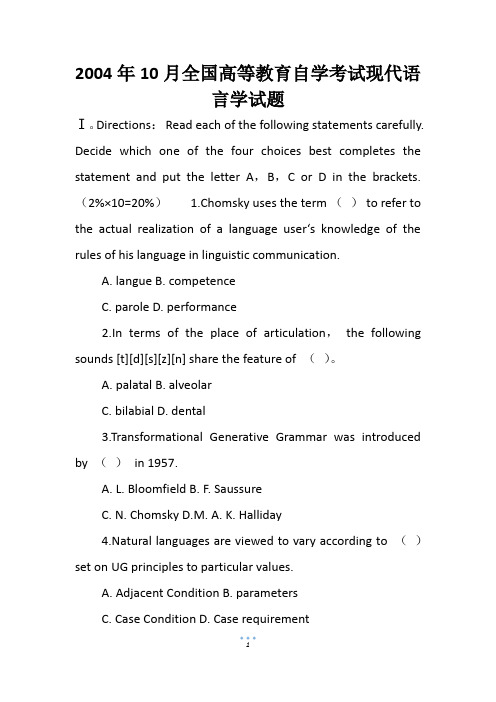
2004年10月全国高等教育自学考试现代语言学试题Ⅰ。
Directions:Read each of the following statements carefully. Decide which one of the four choices best completes the statement and put the letter A,B,C or D in the brackets.(2%×10=20%) 1.Chomsky uses the term ()to refer to the actual realization of a language user‘s knowledge of the rules of his language in linguistic communication.A. langueB. competenceC. paroleD. performance2.In terms of the place of articulation,the following sounds [t][d][s][z][n] share the feature of ()。
A. palatalB. alveolarC. bilabialD. dental3.Transformational Generative Grammar was introduced by ()in 1957.A. L. BloomfieldB. F. SaussureC. N. ChomskyD.M. A. K. Halliday4.Natural languages are viewed to vary according to ()set on UG principles to particular values.A. Adjacent ConditionB. parametersC. Case ConditionD. Case requirement5. Synonyms are classified into several kinds. The kind to which“girl”and“lass” belong is called ()synonyms.A. stylisticB. dialectalC. emotiveD. collocational6. The illocutionary point of ()is to express the psychological state specified in the utterance.A. representativesB. commissivesC. expressivesD. declaratives7. Modern English words man,woman,child,eat,fight,ect. originate from ()。
高中英语完形填空夹叙夹议的基本方法技巧及练习题及练习题(含答案)

高中英语完形填空夹叙夹议的基本方法技巧及练习题及练习题(含答案)一、高中英语完形填空夹叙夹议1.完形填空The guy sat there as car after car drove by. He held a sign that read, “Please help, looking for1 ” He was wearing a worn shirt. After2 I felt like I had spent enough money on myself and that I needed to help someone3 .So I said to my mother, “Could we 4 and get the poor man something to eat?5 he has been sitting there all day, it seemed he6 nothing.” We went down the road and stopped at the McDonald's, ordered a drink and two hamburgers, and then we7 . The man still sat there. I was a little8 so I stepped out of the car slowly. He saw me, stoodup and started to 9 I quickly walked to the man and I expected the man to just 10 the food and not to say anything, because I have 11 that helping someone should not only make him feel good but also help him improve his self-esteem(自尊). I didn't want himto be 12 .And when I 13 the man all we bought, he held my hands tightly. Thenhe said in 14 eyes, “Son, you shouldn't have had to 15 that for me. Anyway, this is such a great thing from 16 and I am so grateful. Thank you very much.”That day I didn't 17 I just helped the poor man and he also helped me. This 18 has given me a happy day and made myself a 19 person. I have collected some clothes for the homeless people and I believe my little kindness can make a 20 .1. A. advice B. time C. money D. food2. A. shopping B. reading C. playing D. sharing3. A. in danger B. in need C. in turn D. in peace4. A. come B. wait C. stop D. appear5. A. But B. Then C. As D. Though6. A. earned B. got C. sold D. noticed7. A. smiled B. left C. returned D. checked8. A. shy B. sad C. tired D. bored9. A. eat B. speak C. scream D. cry10. A. order B. praise C. accept D. offer11. A. agreed B. learned C. guessed D. expected12. A. embarrassed B. inactive C. rude D. frightened13. A. asked B. showed C. told D. handed14. A. curious B. sleepy C. watery D. sharp15. A. change B. do C. borrow D. make16. A. kindness B. strength C. power D. hope17. A. imagine B. hope C. discover D. think18. A. result B. experience C. plan D. meeting19. A. wiser B. busier C. better D. funnier20. A. difference B. deal C. choice D. decision【答案】(1)D;(2)A;(3)B;(4)C;(5)D;(6)B;(7)C;(8)A;(9)D;(10)C;(11)B;(12)A;(13)D;(14)C;(15)B;(16)A;(17)D;(18)B;(19)C;(20)A;【解析】【分析】本文是一篇夹叙夹议文,作者看到一名乞丐,决心帮助这名乞丐。
b5词汇答案

BOOK5 Unit1随堂测试答案Ⅰ.单词拼写1.cured 2.concluded 3.defeating 4.construction5.attend 6.enthusiastic7.scientific 8.severe9.handle10.cautiousⅡ.用所给词的适当形式填空1.scientific 2.conclusion 3.analysis 4.valuable5.announcement 6.construction 7.contribution8.enthusiastic9.movement10.cautious Ⅲ.单句语法填空1.of be suspected of怀疑……。
2.to blame be to blame该受责备。
3.(should) set suggest...从句中用虚拟语气(should) do。
4.delivered their milk与deliver之间为被动关系,故用过去分词形式作宾补。
5.for be responsible for对……负责。
6.in take in欺骗。
7.an; a come to an end结束;a success 一件成功的事。
8.with; in be strict with sb.对某人严格;be strict in sth.对某事严格。
9.fixed her eyes与fix之间为被动关系,故用过去分词形式作宾补。
10.of which feel proud of以……自豪,故用of which 引导定语从句。
Ⅳ.课文浓缩语法填空1.deadly 2.exposed 3.controlled 4.absorbed5.concluded 6.to blame7.linked 8.polluted9.from10.(should) be examinedⅠ.单词拼写1.united 2.clarify 3.conflict 4.attracted 5.delight6.accomplish7.description8.splendid 9.collection10.currencyⅡ.用所给词的适当形式填空1.influenced 2.convenient 3.description 4.attraction5.arrangements 6.united7.illegal8.thrilling9.enjoyable10.consistentⅢ.单句语法填空1.the take the place of代替。
英语词汇学自考题-10_真题-无答案

英语词汇学自考题-10(总分100,考试时间90分钟)Ⅰ.Each of the statements below is followed by four alternative answers. Choose the one that **pletes the statement and put the letter in the bracket.1. We consider that the written form of a natural language is the written record of the ______ form.A. written B. practical C. oral D. grammatical2. ______ refers to the specialized vocabularies by which members of particular arts, sciences, trades and **municate among themselves.A. Slang B. Argot C. Jargon D. Archaism3. Which of the following doesn't belong to the translation-loans?______A. Mother tongue. B. Long time no see. C. Black humour. D. Status quo.4. Which of the following is not included in the Germanic tribes?______A. Angles. B. Celtic. C. Saxons. D. Jutes.5. Which of the following is not true about Old English?______A. Users of Old English borrowed heavily from Latin and other languages. B. Old English has a vocabulary of about 50000 to 60000. C. Old English refers to the English language used from 450 to 1150. D. Old English was a highly inflected language.6. In modern times, ______ is the most important way of vocabulary expansion.A. creation B. semantic change C. borrowing D. reviving archaic or obsolete words7. In the word "contradiction", the morpheme "-diet" is a(an) ______.A. free root B. bound root C. free morpheme D. affix8. Word formation excludes ______.A. affixation **pounding B. conversion and shortening C. chipping, acronymy and blending D. repetition and alliteration9. The primary function of suffixes is to ______.A. change the word-class of roots B. change the meaning of stems C. change the grammatical function of stems D. change the structure of roots10. The following are all denominal suffixes except ______.A. -ful B.-wise C. -less D. -like11. The "house" in "the peasant housed him" belongs to the conversion ______.A. between noun and adjective B. between noun and verb C. between verb and adjective D. none of the above12. A word is **bination of form and ______.A. spelling B. writing C. meaning D. denoting13. Walkman is a ______ motivated word.A. onomatopoeically B. morphologically C. semantically D. etymologically14. Stylistic meaning refers to the features of ______ of words.A. formality B. affectiveness C. appropriateness D. part of speech15. The problem of interrelation of the various meanings of the same word can be dealt with from ______ different angles.A. one B. two C. three D. four16. Of the types of homonyms, ______ constitute the largest number and are **mon.A. perfect homonyms B. homophones C. homographs D. antonymy17. ______ is contrary antonymy.A. "True" and "false" B. "Rich" and "poor" C. "Parent" and "child" D. "Male" and "female"18. Extension of meaning is known as ______.A. elevation B. generalization C. transfer D. degradation19. The semantic change of the word "girl" from "a young person of either sex" to "female young person" is called ______.A. extension B. narrowing C. degradation D. elevation20. In the sentence "She said with an embarrassed laugh. ", the word "embarrassed" can be classified into ______ sense of transfer.A. subjective B. objective C. sensational D. physical21. ______ is very important for the understanding of word-meaning.A. Spelling B. Pronunciation C. Context D. None of the above22. The sentence "He is a hard businessman. " is ambiguous due to ______.A. grammatical structure B. lexical context C. homonymy D. polysemy23. In a broad sense, idioms may include ______.A. colloquialisms B. catchphrases C. slang expressions D. all the above and others24. Let the dog see the rabbit is an idiom ______.A. nominal in nature B. adjectival innature C. verbal in nature D. adverbial in nature25. "Hang in there, old buddy: the worst is yet to come. " In this sentence, "Hang in there" uses ______.A. colloquialisms B. slang C. literary expressions D. alliteration26. ______ refers to idioms in which the name of one thing is used for that of another associated with it.A. Personification B. Euphemism C. Synecdoche D. Metonymy27. Linguistic dictionaries usually cover such areas as ______.A. spelling and pronunciation B. meaning and grammatical function C. usage and etymology D. all the above28. A geographical dictionary is called ______.A. yearbook B. gazetteer C. manual D. lexicon29. CCELD is a brand new dictionary, similar in scope and size to ______.A. Webster B. Longman C. Oxford D. Collins30. The main entries are generally defined or explained in the same language with translations are ______.A. monolingual dictionaries B. bilingual dictionaries C. encyclopedic dictionaries D. pocket dictionariesⅡ.Complete the following statements with proper words or expressions according to the course book.1. Content words are changing all the time whereas ______ words are stable.2. It can be concluded that English has evoked from a synthetic language (Old English) to the present ______ language.3. The number of ______ affixes is small and stable.4. ______ is the process of forming new words by joining the initial letters of names of social and political organizations or special phrases and technical terms.5. By ______ motivation, we mean that the meaning of a particular word is related to its origin.6. Red, scarlet, mauve, violet, lavender, pansy, black, purple, etc., make up the ______ field of "colours".7. The attitudes of classes have also made inroads into lexical meaning in the case of elevation or ______.8. Physical situation or environment relating to the use of words is ______ context.9. The dominant sense of the word dictionary for English-speaking people is a book which presents in ______ order the words of English.10. ______ dictionaries concentrate on a particular area of language or knowledge, treating such diverse topics as etymology, synonyms, idioms, etc.Ⅲ.Define the following terms.1. semantic change2. compounding3. 4a. primary meaning4. lexical context5. pocket dictionariesⅣ.Answer the following questions. Your answers should be clear and short. Write your answers in the space given below.1. Analyse the morphological structures of the following words and point out the types of the morphemes: unfriendly, interpersonal, fore-telling.2. What is the difference between partial and full conversion? Explain with two examples.3. To comment on the rhetorical use of homophones in the following ad: Seven days without 7-Up make one weak.4. State the difference among the three terms: linguistic context, grammatical context and context clue.Ⅴ.Analyze **ment on the following. Write your answers in the space given below.1. (1)Women are flowers. (2)Women are tigers. Study the above sentences. Analyze "women"'s grammatical meaning, conceptual meaning and connotative meaning in each sentence.2. Comment on the sentence: "structural stability of idioms is absolutely unchangeable" and explain the reasons.。
孟昭兰《普通心理学》笔记和习题(含考研真题)详解(第10~12章)【圣才出品】
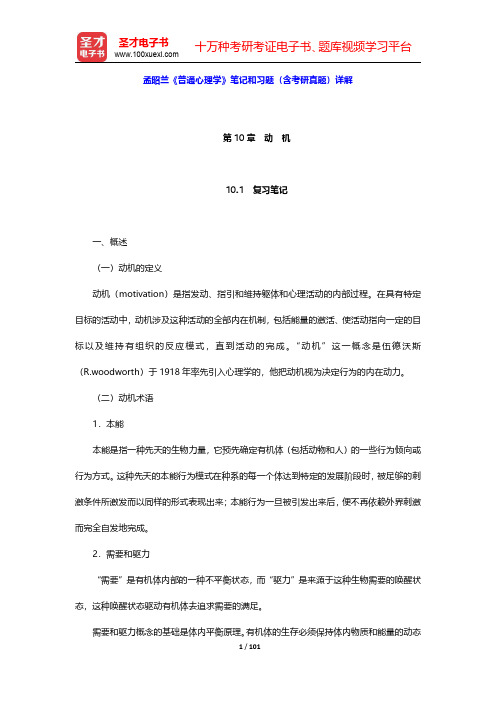
试呈现障碍物、竞争情境和无法解答的难题作为引发动机的刺激条件。此外,诱因的呈现可
激发动机,称为诱因动机。
(四)动机与意志的关系
动机指的是行为的内在动因,意志作为意识的能动方面,也是通过行为表现出来的。“动
机”与“意志”这两个概念既互相区别,又彼此关联。
1.联系
(1)意志是有意识地支配、调节行动,通过克服困难,以实现预定目的的心理过程。
意志通过行为表现出来,受意志支配的行为称为意志行为。
(2)意志行为有很大的动机成分。意志行为的动机,就是为了有意识地去克服困难,
达到预定的目的。意志行为是有意识的、自觉的、有目的的行为,正是由于有明确的目的,
人才能发动有机体作出符合目的的行为,并且制止其他不符合目的的行为。
2.区别
(1)意志行为是与克服困难相联系的。意志这个概念强调的是目的性、意识性和克服
4 / 101
圣才电子书 十万种考研考证电子书、题库视频学习平台
③第三,个人与民族的性格与意志也都是由本能的逐渐发展而形成的。 ④起初提出人类具有以下几种本能:逃避、拒绝、好奇心、好斗、获取、自信、生殖、 合群性、自卑、建设,后来又补充扩展为 18 种本能,并提出本能具有 3 种成分:能量成分、 行动成分和目标指向成分。 (3)弗洛伊德 弗洛伊德也将人类行为的根本原因归结为先天力量,并对本能持有独到的观点。 ①他认为本能不具备有意识的目的,也没有预先确定的方向,许多满足本能的方式是可 以习得的。 ②他提出本能冲动是为满足躯体需要而存在的,它产生一种紧张状态,驱使人采取行动, 通过消除紧张来获得满足。 ③虽然本能基本上在意识层面以下发生作用,但它以各种方式影响人的行为和有意识的 思想、体验,并经常使人处于与社会要求的冲突之中。 ④他认为人类天性中最基本的方面就是生本能与死本能的冲突。生本能的作用在于维持 生存和促使个体生殖繁衍,它表现为无所不在的性行为或性欲望;死本能促使个体通过疾病 老化,而最终死亡。当死本能指向内部时,导致自我破坏行为;当死本能指向外部时,导致 攻击行为。生本能和死本能是决定人类行为的两种基本能量。 3.评价 (1)本能说并未从行为的过程、机制或结构来解释行为,它并未真正地解释行为,而 仅仅是在为行为贴标签。 (2)本能说过分强调固定的先天的行为机制,而许多行为确实可以通过学习来加以改 造。 (二)驱力理论
英语词汇学第五单元测试2
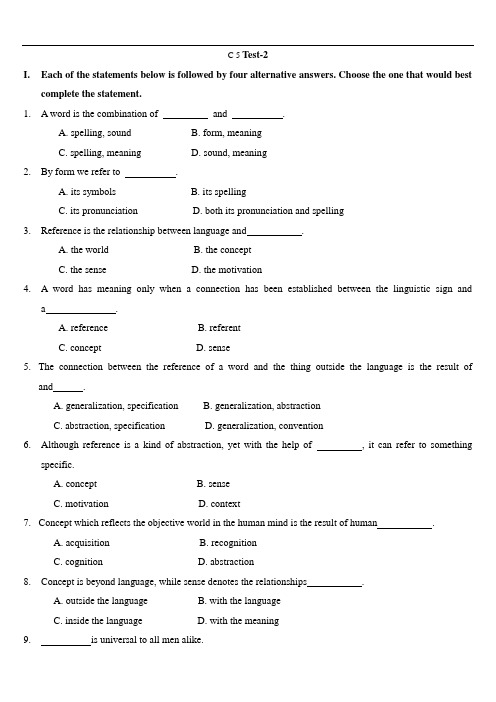
C 5 Test-2I. Each of the statements below is followed by four alternative answers. Choose the one that would bestcomplete the statement.1. A word is the combination of and .A. spelling, soundB. form, meaningC. spelling, meaningD. sound, meaning2. By form we refer to .A. its symbolsB. its spellingC. its pronunciationD. both its pronunciation and spelling3. Reference is the relationship between language and .A. the worldB. the conceptC. the senseD. the motivation4. A word has meaning only when a connection has been established between the linguistic sign anda .A. referenceB. referentC. conceptD. sense5. The connection between the reference of a word and the thing outside the language is the result ofand .A. generalization, specificationB. generalization, abstractionC. abstraction, specificationD. generalization, convention6. Although reference is a kind of abstraction, yet with the help of , it can refer to somethingspecific.A. conceptB. senseC. motivationD. context7. Concept which reflects the objective world in the human mind is the result of human .A. acquisitionB. recognitionC. cognitionD. abstraction8. Concept is beyond language, while sense denotes the relationships .A. outside the languageB. with the languageC. inside the languageD. with the meaning9. is universal to all men alike.A. SenseB. ConceptC. MotivationD. Reference10. Motivation explains the connection between the linguistic symbol and its .A. referenceB. referentC. conceptD. meaning11. The words like “bow-wow”, “bang”, “tick-tuck” are motivated.A. morphologically B semanticallyC. etymologicallyD. onomatopoeically12. “” is not a morphologically motivated word.A. LaconicB. AirmailC. MiniskirtD. Hopeful13. Of the four types of motivation, ________ motivation is supposed to be the oldest, and motivationis the most productive.A. onomatopoeic, etymologicalB. semantic, morphologicalC. onomatopoeic, morphologicalD. etymological, morphological14. The word meaning can be divided into two types, they are .A. conceptual meaning and associative meaningB. grammatical meaning and associative meaningC. grammatical meaning and lexical meaningD. connotative meaning and affective meaning15. Lexical meaning comprises _______ meaning and _______ meaning.A. conceptual, associativeB. conceptual, grammaticalC. connotative, stylisticD. affective, collocative16. meaning surfaces only in use, but________ meaning is constant in all the content words withinor without context.A. Grammatical, lexicalB. Associative, conceptualC. Conceptual, associativeD. Lexical, grammatical17. Conceptual meaning, also known as meaning, is the meaning given in the dictionary andforms the core of word meaning.A. designativeB. cognitiveC. denotativeD. all above18. Associative meaning falls into four types, and they are_______.A. grammatical, lexical, stylistic, and affectiveB. lexical, conceptual, connotative, and collocativeC. connotative, stylistic, affective, and collocativeD. conceptual, connotative, affective, and stylistic19. meaning is unstable, varying considerably according to culture, historical period, and theexperience of the individual.A. LexicalB. CollocativeC. ConnotativeD. Stylistic20. “f ather”, “dad”, “daddy”, and “papa” all have the same meaning, but they differ inmeaning.A. conceptual, affectiveB. conceptual, stylisticC. connotative, affectiveD. affective, stylistic21. “g entle”, “fragile”, “emotional” are the meanings of “woman”.A. connotativeB. affectiveC. stylisticD. associative22. Words that have emotive values may fall into two categories: or .A. lexical, grammaticalB. associative, conceptualC. appreciative, pejorativeD. stylistic, affective23. The words “empty” and “vacant” share the same meaning, but they are different in .A. conceptual, styleB. conceptual, collocationC. lexical, emotive valuesD. associative, connotation24. In componential analys is, the meaning of “boy” can be expressed by _______.A. [+ HUMAN + ADULT+ MALE]B. [+ HUMAN – ADULT – MALE]C. [+ HUMAN + ADULT – MALE]D. [+ HUMAN – ADULT + MALE]25. In making componential analysis, the defining feature between “water”, “gas” and “stone”, tree” can be________.A. [±CONCRETE]B. [±COUNTABLE]C. [±DYNAMIC]D. [±ANIMATE]II. Complete the following statements with proper words or expressions according to the course book.1. Every word that has meaning has sense but not every word has __________.2. The relationship between the word form and meaning is conventional and arbitrary, and most words can besaid to be .3. “foot” in “the foot of a page” is motivated.4. “pen” is a/an motivated word.5. There are a lot of words whose structures are , i. e. their meanings are not the combinations of theseparate parts.6. Semantic motivation explains the connection between the literal sense andsense of the word.7. Part of speech of words, singular and plural meaning of nouns, tense meaning of verbs all belong tomeaning.8. Lexical meaning is made up of conceptual meaning and meaning.9. meaning is the meaning given in the dictionary and forms the core of word meaning.10. Connotative meaning refers to the overtones or associations suggested by themeaning traditionally known as connotations.11. Martin Joos (1962) in his book The Five Clocks suggests five degrees of_________: “frozen”, “formal”,“consultative”, “casual” and “intimate”.12. Affective meaning indicates the speaker’s towards the person or thing in question.13. In the sentence, “Knowledge of inequality has stimu lated envy, ambition and g reed.”, “ambition” has aconnotation.14. “commence”, which has the same meaning with “begin”, is in style.15. Unlike conceptual meaning, meaning is open-ended and indeterminate, liable to the influenceof such factors as culture, experience, religion, etc.16. Componential analysis, according to Leech, is the process of breaking down the sense of a word into its__________ components.Ⅲ. Study the following words or expressions and identify either their types of motivation or their types of meaning.1. quack ( )2. the cradle of Chinese civilization ( )3. a laconic answer ( )4. airmail (to mail by air) ( )5. mother (love) ( )6. handsome (good-looking) ( )7. abode (poetic) ( )8. forget, forgot, forgets ( )9. accuse …of/charge…with ( )10. slender/skinny ( )IV. Answer the following questions. Your answers should be clear and short.1. What is the relationship between reference, concept and sense?2. How is word meaning classified?3. What is the relationship between conceptual meaning and associative meaning?4. How do we generally classify styles?V. Analyze and comment on the following sentences by using what we have learned in this chapter.1. East or west, home is best.Study the above sentence and analyze the conceptual meaning and connotative meaning of “home”. Can we use “house” in this sentence to replace “home”? why or why not?2. (1) They chucked a stone at the cops, and then did a bunk with the loot.(2) After casting a stone at the police, they absconded with the money.Study the differences of the two sentences. Are all the words in the sentences used appropriately? Give your reasons.3. (1) The reactionary’s chief ambition is to become the emperor.(2) One who is filled with ambition usually works hard.Study and analyze the affective meaning of the word “ambition” in the two sentences. What can you learn from it?答案:T -2I. Each of the statements below is followed by four alternative answers. Choose the one that would bestcomplete the state-merit.1.B2.D3.A4.B5.B6.D7.C8.C9.B 10.D11.D 12.A 13.C 14.C 15.A16.A 17.D 18.C 19.C 20.B21.A 22.C 23.B 24.D 25.BII. Complete the following statements with proper words or expressions according to the course book. 1. reference 2. non-motivated3. semantically4. etymologically5. opaque6. figurative7. grammatical 8. associative9. Conceptual 10. conceptual11. formality 12. attitude13. pejorative/negative 14. formal15. associative 16. minimalⅢ. Study the following words or expressions and identify either their types of motivation or their types of meaning.1. onomatopoeic motivation2. semantic motivation3. etymological motivation4. morphological motivation5. connotative meaning6. conceptual meaning7. stylistic meaning 8. grammatical meaning9. collocative meaning 10. affective meaningIV. Answer the following questions. Your answers should be clear and short.· 1.What is the relationship between reference, concept and sense?Reference is the relationship between language and the world. Concept, which is beyond language, is the result of human cognition, reflecting the objective world in the human mind. It is universal to all men alike, so a concept can be expressed by different words and different words can express the same concept. Sense denotes the relationship inside the language. Every word that has meaning has sense, but not every word has reference.· 2.How is word meaning classified?The word meaning can be classified into grammatical meaning and lexical meaning. Lexical meaning itself embraces two components: conceptual meaning and associative meaning. Associative meaning can be further divided into four types: connotative, stylistic, affective and collocative.3. What is the relationship between conceptual meaning and associative meaning?Lexical meaning is made up of conceptual meaning and associative meaning. Conceptual meaning is the meaning given in the dictionary and forms the core of word-meaning. Being constant and relatively stable, conceptual meaning forms the basis for communication as the same word has the same conceptual meaning to all the speakers of the same language. Associative meaning is the secondary meaning supplemented to the conceptual meaning. It differs from the conceptual meaning in that it is open-ended and indeterminate, liable to the influence of such factors as culture, experience, etc.4. How do we generally classify styles?Generally speaking, styles are classified into three types: formal, neutral, and informal.V. Analyze and comment on the following sentences by using what we havelearned in this chapter.1. East or west, home is best.Study the above sentence and analyze the conceptual meaning and connotative meaning of “home”. Can we use “house” in this sentence to replace “home”? why or why not ?The conceptual meaning of “home” is “a dwelling place/a place to live in”. In this saying, the connotative meaning of "home” is: family, warmth, safety, love, convenience, etc.We cannot use “house” to replace “home” in this sentence. Although they have the same conceptual mea ning, they differ in connotative meanings. The connotative meaning of “house” is: coldness, indifference, lacking of love. Such kinds of connotations are not appropriate in the context of this saying.2. (1) They chucked a stone at the cops, and then did a bunk with the loot.(2) After casting a stone at the police, they absconded with the money.Study the differences of the two sentences. Are all the words in the sentences used appropriately? Give your reasons.Apart from the structural difference, the two sentences are quite different in stylistic features of words. The words in both sentences are used appropriately in style. Sentence (1) could be said by two criminals, talking casually about the crime afterwards, so slang words like “chucked”, “cops”, “did a bunk”, “loot” are used. While sentence (2) might be said by the chief inspector in making his official report, thus the words used are literary (“casting”, “abscond”) or neutral (“police”, “money”).3. (1) The reactionary’s chief ambition is to become the emperor.(2) One who is filled with ambition usually works hard.Study and anal yze the affective meaning of the word “ambition” in the two sentences. What can you learn from it?Affective meaning expresses the speaker’s attitude towards the person or thing inquestion. Words that have emotive values can fall into two categories: appreciative or pejorative. In sentence (1), “ambition” conveys a pejorative overtone; while “ambition” is used in appreciative sense in sentence (2). From the above examples we can see that to a large extent the affective meaning of the word depends on the circumstances under which it is used. Either the appreciative or pejorative meaning of the word is brought out only by the speakers in the context.。
北师大版高中英语选择性必修第一册课后习题 Unit 1 Section Ⅲ
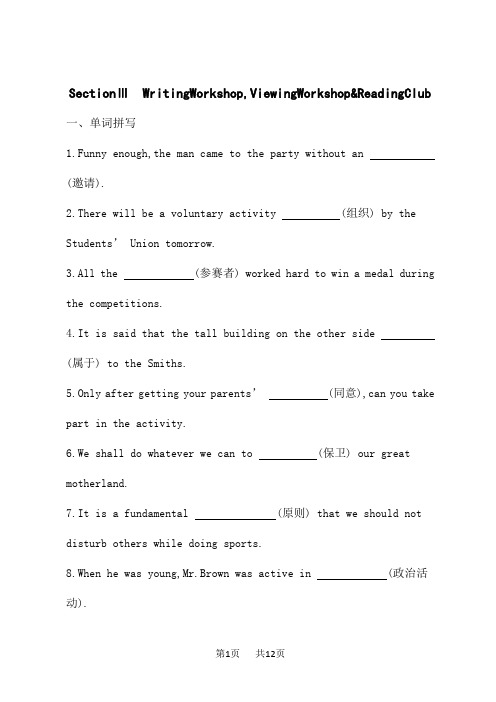
SectionⅢWritingWorkshop,ViewingWorkshop&ReadingClub一、单词拼写1.Funny enough,the man came to the party without an(邀请).2.There will be a voluntary activity (组织) by the Students’ Union tomorrow.3.All the (参赛者) worked hard to win a medal during the competitions.4.It is said that the tall building on the other side(属于) to the Smiths.5.Only after getting your parents’ (同意),can you take part in the activity.6.We shall do whatever we can to (保卫) our great motherland.7.It is a fundamental (原则) that we should not disturb others while doing sports.8.When he was young,Mr.Brown was active in (政治活动).9.There is a sharp (差别) between the twin brothers in their personalities.10.You won’t learn English well,if you study it without much (动力).二、单句语法填空1.Whom does that eost of us want (accept) by others in our realistic life and work.3.With a low confidence herself,the girl is always nervous in her daily life.4.According to the weather report,the weather is likely (turn) cold tomorrow.5.The majority of the milk (have) gone bad.Please throw it away.6.He still holds his own idea and won’t give inanyone.7.Is that everything I should do for you?8.The boy tends (make) his own decision without thinking too much.9. (interesting) enough,the girl just sang out of tune on the stage.10.They lay on the ground, (look) up into the dark sky.三、阅读理解Cala didn’t like us.Any of us.We didn’t do anything to offend her and she didn’t know us but that didn’t matter—she still didn’t like us.As new teachers in the Emirati school,we Westerners greeted her every day.She ignored us.She came into our rooms and bypassed us as she shook hands with all the non-Westerners.Whenever we saw her,she avoided eye contact with us.Eventually,we stopped trying to befriend her.I won’t say her nationality but her friends had been fired from the school.We had been employed in their places and that was enough for her to have nothing to do with us.Well after 16 months in the school we had a secret-friend gifting.To my surprise,I drew her name from the glass jar and thatmeant she was my secret pal.My role was to buy her a gift and say something about her when we publicly acknowledged who our secret pal was.I decided to gift her a coloured bangle(手镯).I added a postcard and wrote “Love and Friendship,Rose-Marie.”Then came the day.We all gathered in the meeting room.When you received your gift,you said a few kind words about your secret friend and passed the gift to them.What could I say?Everyone knew she didn’t like the Westerners.She taught music in the school so I said “My secret pal is someone who bring s music to our ears every day.”She came forward with a huge warm smile.She hugged me and kissed me on both cheeks and accepted my gift.Since then,she smiles often.We hug and shake hands when we meet.I have seen her wear my gift several times and I am so pleased.1.Why didn’t Cala like the Western teachers?A.They stopped befriending her.B.They were newcomers.C.They replaced her friends’ positions.D.They had once offended her.2.How did the writer change Cala’s attitude?A.With the help of her friends.B.Through her love and friendship.C.By showing her talent in music.D.Through her sincerity and wisdom.3.Which of the following can best describe the ending of the story?A.Eplex.C.Beautiful.D.Surprising.4.What does the writer intend to tell us?A.Do nothing by halves.B.A good act will be well rewarded.C.Nothing is impossible to a willing heart.D.Without confidence there is no friendship.四、完形填空When I was 13,my only purpose was to become the star on our football team.That meant beating out Miller King,who was the best 1 at our school.The football season started in September and all summer long I worked out.I carried my football everywhere for 2 .Just before September,Miller was struck by a car and lost his right arm.I went to see him after he came back from 3 .He looked very pale,but he didn’t cry.That season,I 4 all of Miller’s records while he watched the home games from the bench.We went 10∶1 and I was named the most valuable player, 5 I often had crazy dreams in which I was to blame for Miller’s 6 .One afternoon,I was crossing the field to go home and saw Miller 7 going over a fence—which wasn’t 8 to climb if you had both arms.I’m sure I was the last person in the world he wanted to accept 9 from.But even that challenge he accepted.I helped him move slowly over the fence.When we were finally 10 on the other side,he said to me,“You know,I didn’t tell you this during the season,but you did 11 .Thank you for filling in for12 .”His words freed me from my bad 13 .I thought to myself,how even without an arm he was more of a leader.Damaged but not defeated,he was 14 ahead of me.I was right to have 15 him.From that day on,I grew bigger and a little more real.1.A.coach B.studentC.teacherD.player2.A.practice B.showfortD.pleasure3.A.school B.vacationC.hospitalD.training4.A.held B.brokeC.setD.tried5.A.and B.thenC.butD.thus6.A.decision B.mistakeC.accidentD.sacrifice7.A.stuck B.hurtC.tiredD.lost8.A.steady B.hardC.funD.fit9.A.praise B.adviceC.assistanceD.apology10.A.dropped B.readyC.trappedD.safe11.A.fine B.wrongC.quicklyD.normally B.yourselfC.meD.them13.A.memories B.ideasC.attitudesD.dreams14.A.still B.alsoC.yetD.just15.A.challenged B.curedC.invitedD.admired五、选词创境请用本单元重点词汇写一篇小短文。
医学心理学名词解释【中英】From10临五

含金量比较高的一份资料。
不敢说最全,(心理学这东西。
我相信没人敢说能给出最全的名解。
)但是性价比非常高,保证数量尽量少的情况下完成对考点的高覆盖率。
希望对大家有所帮助。
PS:我也不知道心理学对于英文有木有要求。
我只是顺手打上了而已。
求权威消息!---------------------------------------------------------------------------------------Health健康:健康不仅是指没有疾病和虚弱,而应包括躯体、心理和社会适应的良好状态。
medical model医学模式:是指医学的一种主导思想,它是某一时代的各种医学思想的集中反映,包括疾病观、健康观等。
Behavioral medicine行为医学:行为医学就是综合行为科学和生物医学科学知识与技术应用于疾病的预防、诊断、治疗和康复Super-ego超我:人格中体现道德准则的部分,发源于自我,是儿童吸收了父母的是非观念(形成儿童的自我理想)和善恶标准(形成儿童的良心)而形成的,遵循至善原则。
Reinforcement强化:行为之后接着一个特殊事件,使该行为重现频度增加的过程。
Positive reinforcement正强化:行为之后紧接着奖励使该行为重现频度增加者,为正强化Mental health心理卫生:以积极、有效的心理活动,平稳、正常的心理状态对当前和发展着的社会和自然环境以及自我内环境具有良好的适应功能Motivation 动机:引起人类行为的直接动力,能够发动和维持个体行为,在需要的基础上产生。
其核心作用是满足需要,使机体与环境保持平衡。
Need 需要:个体对其生理和心理不平衡的一种反映,表现为对某种目标的渴求和欲望。
具有指向性,周期性和社会历史性。
Frustration 挫折:由于各种障碍而不能达到目的,或趋向目标的进程受阻或被延搁时产生的情况。
Defense mechanism 防御机制:人应对体内外各种紧张性刺激、维护康宁的无意的心理手段,可理解为人们为了应付心理压力或挫折和适应环境而使用的一种策略,多在不知不觉中运用。
北师大第四册unit10生词,词组

BOOK FOUR UNIT TEN1.motivation n. 动力,诱因派生词:motivate vt. 使有动机,促使,激发词组:motivate sb. to do sth. 激励某人做某事例题:Jane is an intelligent student, but she lacks __________(motivate).____________________________________________________________2.variety n. 种类派生词:various adj.不同种类的,各种各样的vary v. 变化,改变词组:a variety of +名词/代词varieties of +名词/代词各种各样,种类繁多a variety of reasons varieties of reasons例题:There are ________(vary) ways of dealing with this problems.______________________________________________________________3.at present=now 目前,现在present n. 礼物,现在v. 提出,介绍adj.现在的,出席的词组:up to present 直到现在for the present 现在,目前拓展:present作出席的,在场的用作后置定语,作目前的,现在的,作前置定语例如:the government leaders present 在场的政府领导人the present government leaders 现任政府领导人____________________________________________________________4.achievement n. 完成,成就achieve v. 完成,实现,达到词组:achieve one’s goal/aim 实现某人的目的,目标例题:Lucy has ______ all of the goals she set for herself in high school and is ready for new challenges at university.A acquiredB finishedC concludedD achieved______________________________________________________________5.break up 散会,驱散,分开,拆散词组:break down 分解,中断,出故障break in 强行进入,打断break into 强行进入,闯入break out 爆发,突然发生例题:One day in July 1979, New York was blacked out by an electricity failure, when hundreds of stores were ______.A broken intoB broken inC broken throughD broken up__________________________________________________________6.put off 推迟,延期词组:put up with 忍受,容忍put up 举起,安装,张贴,建造put through 使穿过,接通电话put out 熄灭,出版,生产put on 穿上,上演,欺骗,增加体重put aside 储存,保留put forward 提出理论等put down 记下,镇压put away 把...收起,储存put sb. out of job 使某人失业put one’s feelings into words 用语言表达感情put sb. to the trouble of doing 麻烦某人做___________________________________________________________7.work out 计算出,估算出,解题work out problems计划,思考work out a new way得到圆满的解决例题:It is up to the government to deal with the environmental pollution problem and ______ measures in line with the council’s suggestion.A set aboutB work outC fill upD bring over_________________________________________________________________8.earn vt. 挣得,赚得词组:earn a/one’s living=make a /one’s living谋生earn fortune 硬的财富earn a good name/fame 赢得好名声例题:You are old enough to _______ your own living.A winB gainC takeD earn__________________________________________________________________9.determine vt. 决定,下决心,限定,确定decide 决定determination n. 决心,果断词组:决定做某事:determine to do sth.be determined to do sth.decide to do sth.make up one’s mind to do sth.例题:How hard the swimmers work now will _____ how they perform in the Olympics.A determineB recoverC dependD control_________________________________________________________________10.concern vt. 关心,挂念,关系到关于n. 关系,利害关系词组:concern oneself with/in 从事,参与concern oneself about/for 担忧,关心as/so far as...be concerned 就...而言feel/show concern about/for 担心,关心be concerned about/for 关心be concerned with 与...有关例题:His parents will be _____ about him if he doesn’t come home as usual.A carefulB sensitiveC concernedD confident___________________________________________________________________11.make sure 确定,确信,查明词组:make sure(of sth./that ) 确保,设法保证make sure if 弄清是否be sure to do sth. 的主语可以是人也可以是物,一定,必然be sure of (doing) sth./that 的主语是人be sure=be certain 确信,有把握例题:I think I locked the door, but I’ll just go back and _____.A find outB feel sureC make sureD be sure_____________________________________________________________12.turn one’s back on/upon sth./sb. 不理睬,不帮忙,背弃词组:turn one’s back to sb. 背朝着某人turn away 把...打发走,解雇turn down降低,减弱turn out 生产,结果是turn in 交还,上交turn off 关闭,关掉turn on 打开,开启turn to 向...求救,求得安慰turn up 发现,出现例题:Obviously, he’s very disappointed at the way things have _______.A turned upB turned outC turned onD turned down_______________________________________________________________13.give away 赠送,分发,泄露秘密,暴露词组:give sth. away免费赠送,赠送,分发,颁发give sth./sb. away 泄露某事/某人give in 屈服,让步give off 发出气味等give out分发,发出give oneself to 把...献给,使埋头于give up one’s seat to sb. 把座位让人某人give up 放弃例题:Don’t mention that at the beginning of the story, or it may _____ the shocking ending.A give awayB give outC give upD give off______________________________________________________________14.be tired of 对...厌恶词组:be tired from be tired with 因...而疲乏be tired of 对...厌倦例题:Mr Smith, _____ of the _____ speech, started to read a novel.A tired, boringB tiring, boredC tired, boredD tiring, boring_____________________________________________________________15.drop out 退出,不再参加,掉队,放弃词组:drop in 拜访at+地名,on+ 人drop behind 落后,掉队drop out of 从...退出drop by 顺便访问一下drop off 下降,减退,入睡drop away 逐渐下降,减少例题:There are still many students who _____ because of lacking money in some poor areas.A leave outB drop outC make outD run out_______________________________________________________________16.aware adj. 意识到,知道的词组:be/become aware of sth./sb./that 对某事/某人知道,明白,觉察到as far as I’m aware 据我所知,as far as I’m concernedbe aware of =be awake to /be conscious of/be sensible of例题:It was several minutes before I was _____ of what was happening.A awareB accusedC afraidD ashamed____________________________________________________________17. enthusiastic adj.热情的,很感兴趣的派生词:enthusiasm n. 热情,热心enthusiastically adv. 热情地enthusiast n. 热心者,热衷...的人词组:be/become enthusiastic about(doing) sth. 对某事/做某事感情趣,对某事热心have enthusiasm about/for 对...有热情show enthusiasm about/for 对...表现出热情例题:The man I have just interviewed gave me a(n)________that he was not very _____about the job.A expression, eagerB impression, enthusiasticC expression, anxiousD impression,interested_________________________________________________________________18.bargain n. 交易,协议,廉价货v. 谈价,谈条件bargaining n. 讨价还价,谈条件词组:bargain with sb. for sth. 与某人为某物讨价还价make a bargain with sb. 与某人成交例题:After_____with the salesman, I got the beautiful dress at the price of 40 yuan at last.A debatingB talkingC discussingD bargaining_________________________________________________________________19.confident adj. 自信的,确信的confidence n. 信心,自信词组:be confident of sth. 肯定、确信某事be confident that 肯定,确信...have confidence in sb. 信任某人gain/lose confidence 增强/失去自信be in sb.’s confidence 受某人的信任with confidence 自信地take sb. into one’s confidence 向某人吐露内心的秘密例题:She _____me_____ her confidence and told me about the problem she was facing.A asked,intoB took,intoC managed,inD made,of_________________________________________________________20.ashamed adj.羞耻的,惭愧的派生词:shame n. 遗憾的事,羞愧shameful adj. 可耻的,不道德的It is a shame to be so wasteful. 如此浪费太可耻。
学术英语课后答案__unit2

Unit 2 Searching for Information9 Enhancing your academic languageReading: Text 51 Match the words with their definitions.1 e2 h3 a4 g5 c6 b7 j8 f9 d 10 i2 Complete the following expressions or sentences by using the target words listed below with the help of the Chinese in brackets. Change the form if necessary.1 automation2 occupational3 immigrant4 uplift5 displacement6 hand-crafted7 ranched8 nutritious9 involved 10 assembly 11 yield 12 incredible 13 optimism 14 mob 15 professional 16 labeled 17 analyst 18 surplus 19 harbor 20 columnist 21 virtual 22 revolutionary 23 lace 24 undercut 25 barter26 litigable 27 specter 28 sift 29 pot3 Read the sentences in the box. Pay attention to the parts in bold.Now complete the paragraph by translating the Chinese in brackets. You may refer to the expressions and the sentences patterns listed above.increasingly important role (越来越重要的作用)tasks humans prefer not to do, or are unable to do(那些人类不愿做或不能做的事)and the like(以及诸如此类的事)settle man’s anxieties(解决人类的担忧)Some questions are raised(问题提了出来)4 Translate the following sentences from Text5 into Chinese.1 最近在《纽约时报》上刊登的一篇文章谈到了一种新计算机软件,该软件瞬间就能筛选数以千计的法律文件并寻找到那些可诉讼的条款,为律师们节省了花费在阅读文件上的数百小时。
【英语】高三英语完形填空夹叙夹议易错剖析

【英语】高三英语完形填空夹叙夹议易错剖析一、高中英语完形填空夹叙夹议1.阅读下面短文。
从短文后各题所给的四个选项(A、B、C和D)中,选出可以填入空白处的最佳选项。
People usually get into a hard life and are unable to escape from themselves.There was once a poor and disappointed salesman complaining every day that there was no 1 for him to display his ability and the 2 was often pulling his legs.At Christmas Eve, every family 3 their houses with lanterns and streamers and it was very 4 everywhere. But he was alone sitting in a bench in a park and recalling the past. It was on the same day last year when he was also alone 5 his Christmas day away, 6 new clothes, new shoes, let alone a new car and a new house.“Damn! I have to spend this Ch ristmas day with these old shoes again." he 7 and beganto take off the old shoes. 8 , he glanced at a young man in a wheel chair passing by him with his hands strugglingly pushing the wheel forward. It 9 him that he was so lucky to have shoes to wear while that man did not even have the 10 Afterwards, the sales man did anything with a calm 11 and cherished every opportunity to improve himself. He worked hard and tried his best to make progress every day. Several years later, he 12 changed his life totally and became a millionaire.If you look all around, you will find there are so many people who were born 13 in the society but they are 14 in life and never complain about the unfair destiny. They are also not to beg others' giving. Instead, they constantly 15 to make themselves stronger and more excellent to 16 the society. By contrast, we should feel 17 .We are born healthy, but we are 18 with life; we complain about our colleagues and dissatisfy with our jobs.Maybe all of us would feel afraid when we realize we have fallen into such 19 state of life, but worse is that you even do not 20 you have fallen into such a dangerous situation.1. A. platform B. chance C. time D. status2. A. poverty B. fate C. ghost D. goal3. A. filed B. made C. decorated D. assisted4. A. temporary B. optimistic C. happy D. festive5. A. spending B. drinking C. celebrating D. congratulating6. A. besides B. with C. except D. without7. A. cried B. sighed C. shouted D. promised8. A. Luckily B. Immediately C. Suddenly D. Surprisedly9. A. dawned on B. focused on C. depended on D. concentrated on10. A. motivation B. recognition C. chance D. challenge11. A. attitude B. feeling C. character D. mood12. A. eventually B. fortunately C. continuously D. awkwardly13. A. tough B. disabled C. stupid D. lucky14. A. energetic B. stubborn C. confident D. serious15. A. decide B. struggle C. remember D. wish16. A. understand B. create C. serve D. shape17. A. guilty B. immoral C. invaluable D. ashamed18. A. fed up B. caught up C. broken up D. cut upcut up19. A. dangerous B. unique C. disappointing D. awesome20. A. show B. realize C. know D. chase【答案】(1)A;(2)B;(3)C;(4)D;(5)B;(6)D;(7)B;(8)C;(9)A;(10)C;(11)D;(12)A;(13)B;(14)C;(15)B;(16)C;(17)D;(18)A;(19)C;(20)B;【解析】【分析】本文是一篇夹叙夹议文,面对生活,有的人常常抱怨生活的不公。
词汇检查
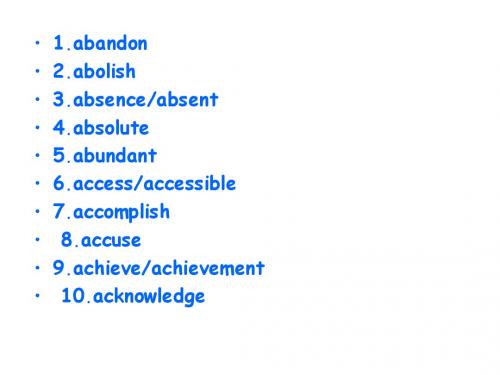
• • • • • • • • • •
1. knowledge 2. lack 3. latter 4. lay (laid, laid) 5. leave (left, left) 6.limit 7. major 8. majority 9. mark 10. master
1.matter 2.mean 3.measure 4.mental 5.merely
1.habit
2.hardship 3.harmony/harmonious
4.graduate/graduation
5.grateful
6.greedy
7.guarantee 8. guilty 9.hesitate/hesitation 10.health/healthy
• • • • • • • • • •
• • • • • • • • • •
1.dormitory 2.double 3.doubt 4,download 5. draw (drew, drawn) 6.due 7.dynasty 8.eager 9.editor cate,educator,education
• • • • • • • • • •
• • • • • • • • • •
1.appearance 2. apply / application / applicant 3. appreciate 4.approach 5. approve/approval 6.argue/argument 7.arrange/arrangement 8.ashamed 9.arise 10. aspect
1.physics / physical / physicist / physician 2.pioneer
高考英语阅读完形作文复习专题:专题06 三年(2019-2021)高考英语阅读理解障碍词汇

高考英语阅读完形作文词汇专题06 三年(2019-2021)高考阅读理解障碍词汇距离高考还有一段时间,不少有经验的老师都会提醒考生,愈是临近高考,能否咬紧牙关、学会自我调节,态度是否主动积极,安排是否科学合理,能不能保持良好的心态、以饱满的情绪迎接挑战,其效果往往大不一样。
以下是本人从事10多年教学经验总结出的以下学习资料,希望可以帮助大家提高答题的正确率,希望对你有所帮助,有志者事竟成!养成良好的答题习惯,是决定高考英语成败的决定性因素之一。
做题前,要认真阅读题目要求、题干和选项,并对答案内容作出合理预测;答题时,切忌跟着感觉走,最好按照题目序号来做,不会的或存在疑问的,要做好标记,要善于发现,找到题目的题眼所在,规范答题,书写工整;答题完毕时,要认真检查,查漏补缺,纠正错误。
总之,在最后的复习阶段,学生们不要加大练习量。
在这个时候,学生要尽快找到适合自己的答题方式,最重要的是以平常心去面对考试。
英语最后的复习要树立信心,考试的时候遇到难题要想“别人也难”,遇到容易的则要想“细心审题”。
越到最后,考生越要回归基础,单词最好再梳理一遍,这样有利于提高阅读理解的效率。
另附高考复习方法和考前30天冲刺复习方法。
2021全国乙卷阅读[第一组]1.update v.使现代化;更新;向……提供最新信息2.source n.来源3.annoyed a d j.恼怒的4.wander v.漫步;游荡;闲逛;徘徊5.awkward adj.令人尴尬的;使人难堪的6.rank n.排;等级;军衔;队列;vt.排列;把…分等7.favor n.偏爱;赞同;善行;vt.赞成;喜爱8.remark n.言辞;vt.评论9.illustrate vt.说明l0.contemporary adj..同一时代的;当代的11.accommodate vt.提供住宿(或膳宿、座位等);容纳;提供空间12.category n.类别;种类13.makeup n.组成;化妆品14.massive adj.巨大的;大而重的:结实的15.cleanup n.清扫;扫除[第二组]1.randomly adv.随意地2.statistically adv.统计学上3.chatter n.喋喋不休;唠叨的话4.outperform vt.做得比…好;胜过5.adventurous adj.有冒险精神的;大胆开拓的6.broken-down adj.状况很差的;出故障的7.killer n.杀手;棘手的事8.distraction n.干扰9.chef n.厨师;大师傅10.retirement n.退隐11.self-worth n.自我价值;自尊12.survey n.调查13.footprint n.足迹;脚印14.transform vt.改变;使…变形;转换15.statistic n.统计资料;统计学[第三组][第三组]1.randomly adv.随便地;任意地2.re-examine v.再次检查;重新考虑3.typically adv.代表性地;作为特色地4.insignificant adj. 无关紧要的5.participant n.参与者;参加者6.expose vt.揭露,揭发;使曝光7.capacity n.能力;容量;资格,地位8.permanent adj.永久的;永恒的9.factor n.因素10.beautify vt.使美化;使变美plex adj.复杂的12.identity n.身份13.necessity n.需要;必然性;必需品14.ecosystem n生态系统15.sculpture n.雕塑,雕刻2021全国甲卷阅读[第一组]ndscape n. (陆上的)风景,景色2.photographer n.拍照者:摄影师3.platform n.讲台:舞台:站台;平台4.classical adj.古典的:经典的5.technique n.技巧,技术,手法6.social adj.社会的7.endangered adj.濒临灭绝的8.costly adj.昂贵的;代价高的9.creativity n.创造力;创造性10.section n.部分;部门:地区11.foreground n.(景物、图画等的)前景;重要位置12.showcase n.展示;陈列柜vt.展示13.fog n.雾;烟雾,尘雾14.mist n.薄雾15.image n.图像[第二组]1.biography n.传记2.breed v.繁育3.creature n.动物;生物4.acceptance n.接纳5.candidate n.候选人,候补者;应试者6.status n.地位;状态7.controversial adj.有争议的8.beam n.横杆9.mountainous adj.多山的;巨大的10.snow-covered adj.被雪覆盖的11.adorable adj.可爱的;可敬重的,值得崇拜的12.skateboard n.溜冰板vi.用滑板滑行13.baggy adj.袋状的,宽松而下垂的14.unacknowledged adj.不被承认的15.critically adv.危急地;严重地;苛求地:批判性地[第三组]1.symbol n.象征:标怎2.genius n.天才人物:(某领域的)天才3.swap v.交换4.youthful adj. 年轻的5.renew vt.使更新6.nerve n.神经7.perseverance n.毅力8.conservative adj.保守的9.discrimination n.歧视;区别10.defensive adj.自卫的:防每用的11.rental adj.租赁的:收取租金的12.questionnaire n.问卷;调查表13.watchtower n.瞭望塔14.uncontrollable adj.无法控制的:无法管束的15.reusable adj.可重复使用的2021新高考全国I阅读[第一组]1.reserve vt.预订(座位等)2.alarm n.闹钟;警报,惊慌vt.警告;使惊恐3.unnatural adj.不自然的:反常的4.mixture n.混合;混合物5.vital adj.至关重要的:生死攸关的6.hostel n.旅社7.staff n.职员8.indicate vt.表明;指出;预示9.cleanliness n.清洁l0.recommendation n.推荐;建议;推荐信11.pricey adj.高价的:过分昂贵的12.security n.安全13.best-rated最高评分的14.affordable adj.负担得起的15.furnishing n.家具:供应[第二组]1.heater n.加热器2.inconveniently adv.不方便地3.explorer n.探险家:勘探者4.cupboard n.碗柜;食橱5.intolerant adj.无法忍受的6.burner n.燃烧器;火炉7.aching adj.疼痛的;心痛的8.habitat n.[生态]栖息地9.decline n.下降;衰退;vi.下降;衰落;谢绝;10.tiny adj.微小的11.ripe adj.熟的,成熟的12.crowded adj拥挤的;塞满的13.acquire vt.获得;取得;学到14.distribute vt.分配;散布;把…分类15.potential adj.潜在的,可能的;n.潜能,可能性[第三组]1.original adj.原来的;首创的,原作的2.strawberry n.草莓3.overly adv.过度地;过于4.initiate v.开始,创始;发起5.rooftop n.屋顶;adj.屋顶上的6.functionality n.用途,功能7.popularization n.推广,普及8.regarding prep.关于,至于9.publicity n.关注;宣传,推广10.scholarly adj.学术的,学术性的11.stability n.稳定性12.skill-based基于技能的13.accurately adv.精确地,准确地14.re-evaluate vt.重估15.adaptively adv.适应性地2020新高考全国I阅读1.disqualification n.不合格;取消资格2.format n.格式;版式3.willpower n.意志力;毅力4.pursue v.追求5.nursing n.护理6.first-generation第一代7.hence adv.因此8.dealing n.买卖,交易9.sadden vt.使悲哀10.well-rounded adj.全面的11.intake n.(食物等的)摄入量2.influential a d j.有影响力的13.principle n.原则14.presentation n.陈述,展示15.restlessly adv.坐立不安地2020全国卷I阅读[第一组]1.valid adj.有效的2.schedule v.安排n.时刻表3.additional ad j.额外的4.familiarity n.熟悉;亲近5.suspicion n.猜疑;怀疑6.transformative adj..革命性的;变革的原7.annually adv.每年8.memoir n.(尤指名人的)回忆录9.aging adj.年老的10.valuate v.估计;评价11.extend v.扩大;扩展12.conditioned adj.受过训练的13.swing n.摆动v.使摆动14.demanding adj.(工作等)要求高的;费力的15.approximately adv.大约[第二组]1.cautious adj.小心的;谨慎的2.productive adj.富有成效的;高效的3.institute n.[学术词]学院,(研究)院/所4.diverse adj.多种多样的;不同的5.sensor n.(探测光、热等的)传感器;感应装置6.detect v.[学术词]探测;检测7.chemical n.[常用复数]化学物质;化学品8.groundwater n.[合成词]地下水9.faint adj.[课标外词](光、声、味等)微弱的10.self-powered adj自供电的11.one-off adj.一次性的12.glow n.微羽稳定的光:暗淡的光13.fade v.变暗14.expose v.使暴露15.consume v.消耗;耗费(尤指燃料、能量或时间)[第三组]1.transmit v.输送2.consumption n.消耗(量)3.pollution-free adj.无污染的4.self-acceptance自我接受5.empower v.给予…力量6.accomplishment n.成就7.imperfection n.缺点8.unworthy adj.不值得的9.awesome adj.极好的;了不起的10.spacecraft n.[航]宇宙飞船;航天器11.unmanned adj.无人的;无人操纵的12.block n.块;街区;障碍物vt.阻塞;限制13.orbit n.轨道14.signal n.信号;暗号15.obtain vi.获得vt.获得2020全国卷II阅读[第一组]1.attraction n.旅游胜地,吸引人的事物2.mansion n.公馆;宅第3.celebrated adj.著名的4.award-winning adj.获奖的5.interactive adj.互动的;交互式的6.inspirational adj.启发灵感的7.riches n.[复数]财富8.high-tech adj.高科技的9.uneasy adj.不自在的:忧虑的10.psychologist n.心理学家11.predictor n.有预测作用的事物12.assess vt.[学术词]评定13.statement n.[派生词]声明14.high-income adj.高收人的plex adj复杂的[第二组]1.finding n.[常用复数]研究结果2.developmental adj.发展的3.aspect n.方面4.self-control n[合成词]自制力5.environmentalist n.环保主义者6.ecologist n.生态学家7.purchase v.[正式用语]买;购买8.rotate v.旋转9.guilt-free adj.没有负罪感的10.wetland n.湿地,沼泽11.collapse v.崩溃:倒塌12.multiply v.成倍增加13.convince v.[学术词]使相信;使信服14.promote v.推广15.shelve v.把……放在架子上2020全国卷Ⅲ阅读[第一组]1.conflict n.矛盾;分歧:冲突2.rising adj.上升的:升起的3.trend n.趋势4.evolution n.进化5.highland n.[通常用复数形式]高地;高原6.adaptation n.适应7.number v.总计8.traditionally adv.历来9.genetics n.遗传学10.significance n.重要性:意义11.remodel v.改变…的结构或形状12.registry n.登记处13.unpack v.打开(盒子、包或手提箱等)取出(物品)14.reflect vt.反映:反射15.lifelike adj.栩栩如生的:逼真的[第二组]1.reputation n.名声;名誉;声望2.masterpiece n.杰作3.playgoer n.经常去戏院看戏的人:爱看戏的人4.effectiveness n.有效性5.houselight n.剧院灯光6.flash v.(使)闪光7.push vt. 促使(达到某程度或状态)8.adaptive adj.适应的9.jammed adj.挤满的;堵塞的10.smart adj.(机器等)智能的11.sharp adj.(变化)急剧的,骤然的12.managerial adj.[派生词]管理的13.automatic adj.自动的:自动化的14.widen vt.(使)变宽15.analytical adj分析的;解析的2019全国卷I阅读[第一组]1.employment n.职业;雇用2.management n.管理;管理人员3.agency n.代理;中介;机构4.recall vt.回想起5.identity n.身份6.theft n.盗窃;偷;赃物7.scan vt.扫描;浏览8.precisely adv.精确地9.security n.安全;安全性l0.straightforward adj.简单的;坦率的;明确的mercialize vt.使商业化;使商品化12.psychology n.心理学13.interpersonal adj人际的:人与人之间的14.adolescence n.青春期15.spray v.喷洒;往…上撒[第二组]1.engage vi.从事;参与2.survey n.调查3.aggressive adj.侵略性的:好斗的:有进取心的4.analyse vt.分析:分解5.data n.数据(datum的复数):资料6.tablet n.药片:写字板;平板电脑7.shrink v.缩小,收缩8.fundamental adj.基本的;根本的9.medium adj中间的;中等的10.visual adj.视觉的;视力的mitment n.承诺;保证12.wallpaper n.壁纸;墙纸13.review n.回顾;复习;评论14.prohibit vt.禁止15.lengthen vt.使延长;加长2019全国卷Ⅱ阅读1.delightful adj.可爱的;令人愉快的2.brilliant adj.灿烂的;闪耀的;杰出的3.tension n.紧张;不安4.anxiety n.焦虑;渴望5.frustration n.挫折6.outbreak n.(战争的)爆发7.evil adj.邪恶的;有害的8.relieve vt.解除;减轻munity n.社区10.motivation n.动机;积极性11.statistics n.统计12.basis n.基础;底部13.interaction n.交流14.awkward adj.尴尬的;笨拙的15.bacteria n.细菌16.astronaut n.宇航员;航天员17.impact n.影响18.workable adj.切实可行的19.desire n.欲望;要求vt.想要;要求20.circumstance n.环境;状况;境遇2019全国卷Ⅲ阅读1.studio n.工作室;演播室2.immigrant adj.移民的:迁入的n移民;侨民edy n.喜剧;喜剧性4.inspiration n.灵感;鼓舞5.source n.来源;水源6.fashion n.时尚;时装7.imagination n.想象力8.contemporary adj.当代的9.breathtaking adj.惊人的;惊险的;令人激动的10.trade n.贸易,交易11.mass n.大量,众多12.available adj.可获得的;可找到的;有空的13.selective adj.选择性的;有选择的14.circle n.循环;周期15.calculation n.计算;估计16.systematic adj.系统的;体系的17.extend vt. 延伸;扩大18.irrelevant adj.不相干的;不切题的19.financial adj.金融的;财政的ment n.评论;意见;批评;描述高考质量提升是一项系统工程,涉及到多个方面、各个维度,关键是要抓住重点、以点带面、全面突破,收到事半功高考质量提升是一项系统工程,涉及到多个方面、各个维度,关键是要抓住重点、以点带面、全面突破,收到事半功倍的效果。
10(Staff Motivation)
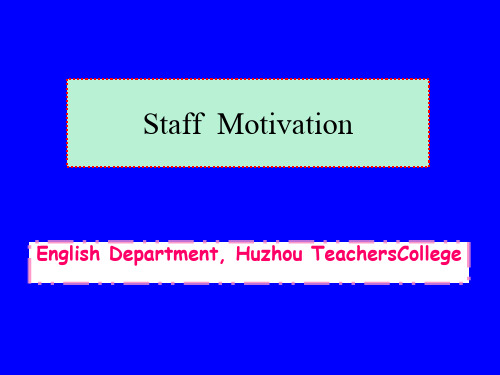
2. Managers assume that the goals of employees are those of the company. Do you agree? Why or why not? 1) Agree / why The employees’ interests are in line with those of the company. The employees’ goals, such as improved benefits / pay rise / career development / more bonus / good opportunities of promotion, are based on the company’s goals to maximize profitability, to improve overall strength of the labour forces, to achieve good sales, to continue company growth, etc.
根据各人体现的劳动价值给予报酬。要考虑市场劳力 供求、掠夺性竞争对手以及员工的各自贡献等诸多因 素。
To preserve forever; caused to be remembered for ever.
9. We get the perpetuation of incompetence.
于是,不称职的情况便长久存 在,积重难返。
3. Motivation stems from job satisfaction and not financial reward. Do you agree? Why or why not? 1) Agree / why Job satisfaction is the pleasure one feels when one does the job. It is something spiritual. To do a meaningful job, to be happy at work and to be recognized are more important. When one is secured with basic material life, he would be in need of spiritual satisfaction. Many people are motivated by a rich and interesting, job or by their interest in certain job rather than in only financial reward.
- 1、下载文档前请自行甄别文档内容的完整性,平台不提供额外的编辑、内容补充、找答案等附加服务。
- 2、"仅部分预览"的文档,不可在线预览部分如存在完整性等问题,可反馈申请退款(可完整预览的文档不适用该条件!)。
- 3、如文档侵犯您的权益,请联系客服反馈,我们会尽快为您处理(人工客服工作时间:9:00-18:30)。
Synecdoche 提喻
• • • • Sail—ship Hand—man The smiling year—spring A Solomon—a A watched kettle never boils. • He never let his heart rule his head.
Onomatopoeic motivation rumbling thunder Cars crashed into each other Glass, glitter, glide
Semantic motivation 语义理据
• The mouth of the river 河口 • The nose of the plane 机首,机头 • Head of department
反义类比
• Daylighting –白天兼职,晚上主要工作 • Low-rise—低层建筑 • Cold line—冷线
Analogy 近似类比
• Missile gap (美国与苏联在导弹发展上的差 距) Generation gap, development gap Production gap, credibility gap • Watergate
The meanings of “meaning”
• Sense 涵义 • Reference 指称义 • Concept 概念
cognition Relationship inside the language
Relationship between language and world
Motivation 词的理据 • Motivation accounts for the connection between linguistic symbol and its meaning.
• • • • the mouth of a river the foot of the mountain He is fond of the bottle. The pen is mightier than the sword.
Metaphor 隐喻
Metonymy
换喻,转喻
Semantic motivation 语义理据
• Meaning and concept are both related to referents and are notions of the words but belong to different categories. • Concept—beyond language, result of human cognition, reflecting the objective world in the human mind. It is universal to all men alike regardless of culture, race, language and so on. • Meaning– belongs to language, restricted to language use.
• Referent 指称,所指—an object, a phenomenon, a person, etc that the word stands for. • Reference – the relationship between language and the world.
Concept 概念
cat
Sense and reference
涵义与指称义 Sense—denotes the relationship inside the language. “The sense of an expression is its place in a system of semantic relationships with other expressions in the language.” Reference—relationship between language and the world.
• A tall clock tick-tacked on the stair.
Onomatopoeic motivation 拟声理据
• The sounds of some words suggest the meanings, for these words were created by imitating natural sounds.
Metaphor
• They were allowed to leapfrog the long lines of traders and get immediate appointments with Chinese representatives • US influence and prestige nosedived in Africa. • The came up with a plan for drastic pruning of the bloated institution.
Etymological motivation 词源理据
• By etymological motivation, we mean that the meaning of a particular word is related to its origin.
Motivation 词的理据
1. Onomatopoeic motivation 拟声理据 2. Semantic motivation 语义理据 (figurative sense) 3. Morphological motivation 形态理据 4. Etymological motivation 词源理据
Motivation for words
Onomatopoeic motivation 拟声理据 Semantic motivation 语义理据 metaphor metonymy synecdoche analogy Morphological motivation 形态理据 Etymological motivation 词源理据
Analogy 类比
• talkathon (马拉松式谈话或座谈节目) • telethon (马拉松式电视广播节目)
marathon
Color analogy 色彩类比
His short play is in the white list. (批准上演的 节目名单) grey list—非明文查禁但仍属不合法的人或物 grey-collar workers—服务性行业的职工 Blacklist White-collar, bule-collar
The meanings of “meaning”
• Reference 指称义 • Concept 概念 • Sense 涵义
• What is the meaning of “cat”?
Sense and reference
涵义与指称义
Animal dog tiger leopard horse What’s the relationship?
Morphological motivation 形态理据
• • • • Airmail Reading-lamp Miniskirt hopeless
Morphological motivation concerns the words whose structures, that is, composing elements, suggest their meaning.
• Semantic motivation refers to the mental associations suggested by the conceptual meaning of a word. It explains the connection between the literal sense and figurative sense of the word.
• A lot of words whose structures are opaque, their meanings are not the combination of the separate parts. • Black market • greenhorn
Semantic motivation 语义理据
• • • • • • Cats miaow. Cocks crow. Bees buzz. Mice squeak. Goats bleat. Lions roar. Dogs bark. Ducks quack. Frogs croak. Horses neigh. Snakes hiss. Elephants trumpet.
Etymological motivation 词源理据
• Pen—writing tool
• A laconic answer: a brief answer, short answer • Lacons– a tribe of people famous for their brevity of speech.
Number analogy数字类比
The Fourth World (最贫国集团) The First Family The three R’s (reading, writing arithmetic)
Space analogy 地点空间类比
• • • • Moonscape—landscape Marrain(火星上地形)—terrain Earthrise—sunrise Spacefaring(航天飞行)--seafaring
